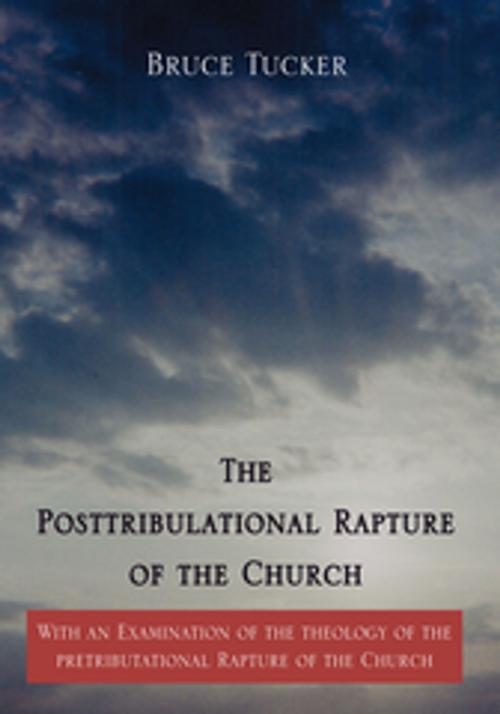The Posttribulational Rapture of the Church
With an Examination of the Theology of the Pretributational Rapture of the Church
Nonfiction, Religion & Spirituality, Reference, Eschatology| Author: | Bruce Tucker | ISBN: | 9781462800339 |
| Publisher: | Xlibris US | Publication: | December 17, 2001 |
| Imprint: | Xlibris US | Language: | English |
| Author: | Bruce Tucker |
| ISBN: | 9781462800339 |
| Publisher: | Xlibris US |
| Publication: | December 17, 2001 |
| Imprint: | Xlibris US |
| Language: | English |
There are numerous texts written about the rapture and the end times. A brief excursion to your local Christian bookstore will provide ample evidence of the interest in this topic. From time to time people will attempt to give their text a twist or a slant in order to make their text different from the others. Nevertheless, most books about the rapture present the standard pretribulational argument, and their unique nesses rest primarily in the contemporary issues which have stimulated the renewed discussion. New developments in the Middle East will usually generate a new set of books. Today the New World Order, Y2K, and even El Nino have provided fresh grist for predicting an imminent rapture. The interest, enthusiasm, publications, and even movies about the rapture are still increasing. A series of fictional novels about the tribulation period are cranked out monthly. Recent Hollywood motion pictures, including "Left Behind", are based upon this.
This book is different for several reasons. It does not emphasize any contemporary issue or current events which relate to the pretribulational scenario. Instead, it will spend its energies on specific biblical principles and doctrines, and leave the application of those doctrines to the reader. What is more unique is that this book promotes a posttribulational rapture, a position which is different from most of the other books, and it critiques the theology of the pretribulational rapture which is the foundation for most of the other texts. Books which promote a posttribulational rapture are few, indeed, and they are often too technical for the average lay-person. There is a need for a book which is a comprehensive look at the rapture question, and yet attempts to keep the language more understandable.
To achieve the goal of being comprehensive, this book is divided into three parts: 1.) a critique of the major arguments for a pretribulational rapture, 2.) an analysis of the major biblical sections which discuss the rapture, and 3.) a selective commentary on the Book of Revelation.
The first section defines and evaluates the major pretribulational arguments. These arguments are repeated time and again in books promoting a pretribulational rapture. They are significant because they either help sustain a pretribulational rapture if justified, or they weaken it significantly if not.
" The church is not destined for wrath."
"The rapture must be imminent."
"The distinction between the church and Israel."
"The posttribulationists spiritualize the Bible."
"The types and parables teach a pretribulational rapture."
"The differences between the rapture and second coming."
The second part of the book is an exposition of the major sections of the Bible which discuss the rapture. As the first part writes from the perspective of systematic theology, the second part deals with biblical theology. The Bible is evaluated independently from a system of theology, and attempts to interpret the major texts on the rapture. Here are the passages to be addressed.
"The rapture passages in the Gospels."
"The rapture passages In First and Second Thessalonians."
"The rapture passages in First Corinthians."
"The rapture passages in Second Peter".
The third part focuses upon the Book of Revelation. No discussion of the issue of the rapture or eschatology could be complete without including a discussion on this book. This book is both complicated and controversial, and my intent is not to write a complete commentary about Revelation, but only to discuss what is necessary to
There are numerous texts written about the rapture and the end times. A brief excursion to your local Christian bookstore will provide ample evidence of the interest in this topic. From time to time people will attempt to give their text a twist or a slant in order to make their text different from the others. Nevertheless, most books about the rapture present the standard pretribulational argument, and their unique nesses rest primarily in the contemporary issues which have stimulated the renewed discussion. New developments in the Middle East will usually generate a new set of books. Today the New World Order, Y2K, and even El Nino have provided fresh grist for predicting an imminent rapture. The interest, enthusiasm, publications, and even movies about the rapture are still increasing. A series of fictional novels about the tribulation period are cranked out monthly. Recent Hollywood motion pictures, including "Left Behind", are based upon this.
This book is different for several reasons. It does not emphasize any contemporary issue or current events which relate to the pretribulational scenario. Instead, it will spend its energies on specific biblical principles and doctrines, and leave the application of those doctrines to the reader. What is more unique is that this book promotes a posttribulational rapture, a position which is different from most of the other books, and it critiques the theology of the pretribulational rapture which is the foundation for most of the other texts. Books which promote a posttribulational rapture are few, indeed, and they are often too technical for the average lay-person. There is a need for a book which is a comprehensive look at the rapture question, and yet attempts to keep the language more understandable.
To achieve the goal of being comprehensive, this book is divided into three parts: 1.) a critique of the major arguments for a pretribulational rapture, 2.) an analysis of the major biblical sections which discuss the rapture, and 3.) a selective commentary on the Book of Revelation.
The first section defines and evaluates the major pretribulational arguments. These arguments are repeated time and again in books promoting a pretribulational rapture. They are significant because they either help sustain a pretribulational rapture if justified, or they weaken it significantly if not.
" The church is not destined for wrath."
"The rapture must be imminent."
"The distinction between the church and Israel."
"The posttribulationists spiritualize the Bible."
"The types and parables teach a pretribulational rapture."
"The differences between the rapture and second coming."
The second part of the book is an exposition of the major sections of the Bible which discuss the rapture. As the first part writes from the perspective of systematic theology, the second part deals with biblical theology. The Bible is evaluated independently from a system of theology, and attempts to interpret the major texts on the rapture. Here are the passages to be addressed.
"The rapture passages in the Gospels."
"The rapture passages In First and Second Thessalonians."
"The rapture passages in First Corinthians."
"The rapture passages in Second Peter".
The third part focuses upon the Book of Revelation. No discussion of the issue of the rapture or eschatology could be complete without including a discussion on this book. This book is both complicated and controversial, and my intent is not to write a complete commentary about Revelation, but only to discuss what is necessary to















